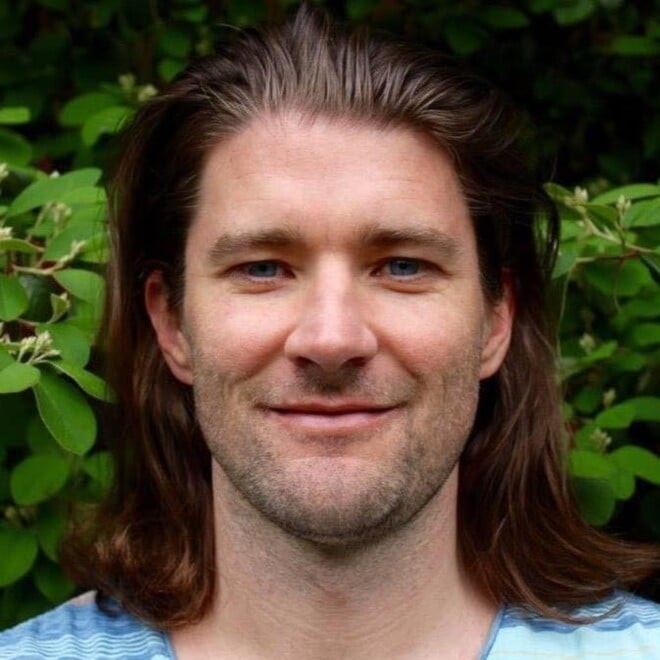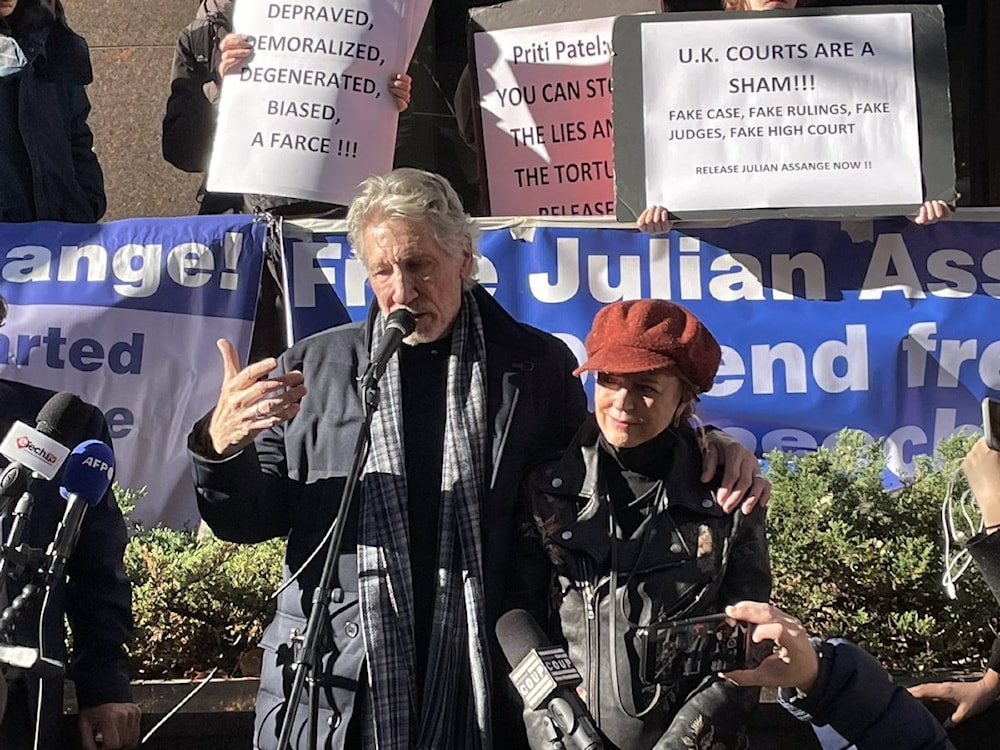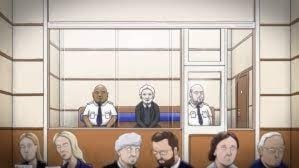The Trust Fall: Julian Assange, Kym Staton’s brave take on a brave man
"The Trust Fall: Julian Assange" explores the life of a daring journalist who exposed classified information at a great personal cost, the impact of WikiLeaks' revelations, the fierce government crackdown that followed, and the wider debate on press freedom and what the public has the right to know.
-

The Trust Fall: Julian Assange poster
"What if everything we thought we knew about somebody was a lie, would we have the courage to see through it with a fresh perspective? Would we be willing to go on a new journey of understanding?"
This is the question filmmaker Kym Staton throws at us in his documentary "The Trust Fall", urging us to confront our own biases.
Musician Roger Waters then proceeds with his gruff voice, "This is a story of deception, lies, bravery, and a man who risked everything to bring the truth to light."
The man in question here is of course none other than award-winning Australian journalist and publisher Julian Assange, the founder of WikiLeaks.
"The Trust Fall: Julian Assange" (produced by Films For Change) explores the life of a daring journalist who exposed classified information at a great personal cost, the impact of WikiLeaks' revelations, and the fierce government crackdown that followed, exploring the wider debate on press freedom and what the public has the right to know.
The documentary is the directorial debut of Australian filmmaker Kym Staton, founder and director of Films For Change, and was filmed over two years across three continents and 10 cities.
-

Australian Filmmaker Kym Staton
Staton takes viewers on a 128-minute journey documenting and exploring Assange’s life, featuring first-hand accounts and powerful interviews with an array of experts such as late Pentagon Papers whistleblower Daniel Ellsberg, the late John Pilger, as well as Tariq Ali, Chris Hedges, Jennifer Robinson, Jill Stein, Stefania Maurizi and Nils Melzer, and many more…
He also includes personal insights from Assange's family, including his wife Stella, father John Shipton, and brother Gabriel Shipton.
Staton doesn't just present a historical record but also sheds light on the importance of Assange’s work. Here, Staton introduces us to a young Iraqi survivor of US bombing, offering a poignant first-hand account of the human cost of the US' war on Iraq.
The documentary includes intermittent narration by a star-studded cast, featuring Susan Sarandon, singer M.I.A., Roger Waters, Tom Morello, and Jonathan Oldham, creating a dynamic listening experience.
-

Roger Waters and Susan Sarandon during a Julian Assange support rally at the British Consulate in New York City (Photo credit: Assange Defense)
In 2023, Al Mayadeen Media Network produced a documentary series, "A Man Vs. An Empire," offering a compelling perspective on Julian Assange. This three-part examination delves into the collaboration of powerful nations to dismantle Assange's influence.
"The Trust Fall: Julian Assange" arrives at a crucial moment. London’s High Court has ruled that Julian Assange has the right to appeal in his final challenge against extradition to the United States. The US government is after Assange for his publication of thousands of classified US military documents, exposing some of their war crimes in overseas wars, which of course they’d rather keep buried deep.
The WikiLeaks founder is currently confined in London’s high-security Belmarsh prison. If sent to the United States and found guilty, he could face up to 175 years in prison, with some fearing worse.
Julian Assange and the birth of WikiLeaks
"We are familiar with groups whose abuse we expose attempting to criticize the messenger to distract from the power of the message"
- Julian Assange
Certain phrases burrow into your memory, refusing to be dislodged. If you ask me what’s a sentence that I can’t forget, it would be when a US veteran was looking down at a group of dead Iraqis after shooting them from an Apache helicopter in a series of air-to-ground attacks, and sneering, "Oh yeah look at those dead bastards… nice" as his victims lay on the street.
On July 12th, 2007, in New Baghdad, Iraq, 12 unarmed civilians, including two Reuters journalists were killed. The tragedy remained shrouded in secrecy until 2010, when WikiLeaks released a damning 39 minutes of classified footage – the now infamous Collateral Murder video.
"The Trust Fall: Julian Assange" presents the uncensored Collateral Murder footage, a testament to the brutality WikiLeaks documented.
"The Collateral Murder video is just one of the ten million disclosures of WikiLeaks, but it is an incredibly significant one. It gave us such a powerful insight into the callousness of modern war and the attitude of US soldiers, behaving as if they are playing a computer game, whilst killing civilians and journalists," Filmmaker Kym Staton tells Al Mayadeen English.
Staton believes that the Collateral Murder video made the US Government, its warmongers, and arms dealers panic, "as they saw that Assange and WikiLeaks were going to be a hindrance to their endless wars for profit."
This leak, courtesy of whistleblower Chelsea Manning who provided WikiLeaks with the video and a trove of sensitive documents, kickstarted a relentless pursuit of Julian Assange by the US and its allies.
Daniel Ellsberg, Edward Snowden, and Chelsea Manning all risked imprisonment to expose government wrongdoing. By showcasing their stories alongside Assange's, Staton’s documentary emphasizes the courage of whistleblowers.
Furthermore, "The Trust Fall: Julian Assange" includes a powerful and exclusive interview with Sajad Mutashar, a young Iraqi survivor of the Collateral Murder incident. His firsthand account adds a profoundly personal and emotional dimension to the story.
Julian Assange vs. media wars and imperialism
"If wars can be started by lies, peace can be started by truth."
- Julian Assange
This film transcends a mere biography; it's a call to action, as Staton doesn't shy away from shedding light on the importance of Assange's work.
See, in his movie, Staton doesn’t only tell us the story of Julian Assange, he also narrates the story of WikiLeaks. He describes it as a journalistic innovation, dedicated to safeguarding information and protecting sources. The film also underscores why WikiLeaks, in Assange's view, was a necessity: a counterpoint to a media landscape he perceived as manipulated and controlled.
WikiLeaks' release of over 91,000 classified military documents, dubbed the Afghanistan War Diary and the Iraq War Logs, exposed a horrific tally of over 15,000 concealed civilian deaths. Wikileaks did what mainstream media often wouldn't: Provide the public with an unprecedented level of transparency into the US government's actions, and consequently its crimes, abroad.
This is precisely why the US has relentlessly pursued Assange since the leak, with both the UK and Australia playing a disturbing role in the legal proceedings, as showcased in the documentary.
The film also tackles how the US indictment has no credible factual basis. Despite this, the relentless pursuit continues. Staton meticulously highlights the "punishment by process" tactics employed, and touches upon the absurd procedures taken against Julian to separate him from his legal team. This starkly reveals the case's true nature: not a legal battle, but a political one.
-

An Illustration of Assange in a courtroom, separated from his legal team. (A screengrab of the film) -

An Illustration of Assange in a courtroom separated from his legal team (a screengrab of the film).
The film also focuses on the role of Western media, through its washed-up propaganda, in deceiving the public, and delves into the relentless attempts to discredit Assange's journalistic credentials. This smear campaign is a key element of the media and government's strategy to justify his prosecution.
"Public trust in mainstream legacy media is at an all-time low. The media is controlled by corporations and governments more so now than ever before. Every day, more people are realizing that they have to go to independent media to find the truth and an alternative narrative," Staton tells Al Mayadeen English.
He affirms that he, like many others, gets about 80% of his news from independent news sources and tunes into mainstream media "very little."
The silencing and imprisonment of journalists are not the only tools of imperialist and colonial powers. Assange's case is just one example.
"When making this documentary, I was shocked to learn that over 500 journalists are currently in prison for their work, and around 40-50 are killed every year," Staton says
Al Mayadeen is among the many media bodies that have been directly targeted by colonial powers. Martyrs Farah Omar and Rabih Me'mari, who were killed by the Israeli occupation on November 21, 2023, serve as a stark reminder of the occupation’s ruthlessness.
"I know that Julian Assange has recently expressed his sympathy for the journalists killed in Gaza. It is a tragedy that journalists are jailed, detained, or killed while trying to bring news and the truth to the public," Staton underscores.
Julian Assange: Behind the headlines
"If we can only live once, then let it be a daring adventure that draws on all powers."
- Julian Assange
In this documentary, we get a closer look at the heart of Assange, painting a portrait of him through the eyes of his family, friends, and colleagues.
For years, government officials and mainstream media have relentlessly smeared him, labeling him as a rapist, a Russian agent, and a reckless figure who endangered lives. The documentary dismantles these fabricated narratives, starting with the trumped-up 2010 rape allegations against Assange by two Swedish women (Assange was never formally charged and the investigation was shut down in 2019).
Staton embarks on a mission to reveal the true Assange, a side lost in the media maelstrom. We hear from his loved ones who describe him as quirky, an observer of people, incredibly caring, nerdy, loving, fun to be around, and very funny…
"Most people have only seen a false portrayal of Julian. A fabricated image of a ‘villain’ and a ‘traitor’, with accompanying headlines suggesting criminality. I thought that it would be valuable to humanize Julian. To reveal him as a person, with quirks, flaws, humor, creativity, compassion, and individuality," the filmmaker explains.
Staton tells us about a man who loves to go on hikes with his friends, loves listening to music, and carefully plans a heartfelt proposal to his partner, even amid immense personal struggles.
-

Stella Moris poses with her sons Gabriel, and Max, left, for the media and supporters as she arrives to marry her partner, WikiLeaks founder Julian Assange. (AP)
Simultaneously, Staton masterfully utilizes visuals to transport us into Assange's world, allowing the audience to grasp his mental state and vulnerability. Through a powerful art installation replicating his Belmarsh prison cell and the chilling audio of a Christmas Day at the prison in 2021, the documentary sheds light on the harsh realities of Assange's confinement and the hardships he endures in custody.
"Assange is currently in extremely harsh conditions; in a 6m² cell in solitary, 22 hours a day, next to people who, unlike him, are actually criminals. Whilst we weren’t able to film inside the prison, we did manage to obtain rights to show actual footage of the inside of Belmarsh prison, as well as use some images of a replica Belmarsh prison cell by artists Manja McCade and Tom Aslan, combined with actual audio of the prison recorded by Julian’s wife Stella Assange," Staton says.
-

An image of HMP Belmarsh in London where Julian Assange is currently detained. (AP)
After seeing him through the eyes of family and friends, how would director Kym Staton describe Julian Assange?
"I would describe Julian as highly intelligent, courageous, principled, visionary, compassionate, creative, and driven. His achievements in creating the dual innovations and inventions that form the WikiLeaks platform are incredibly significant in a historical context," Staton says.
"His drive and determination to bring the WikiLeaks media organization together shows his incredible tenacity and commitment. His courage in taking on the world’s major powers and revealing the crimes of the elite is astonishing. His ability to survive the defamation, smearing, and psychological torture of prolonged indefinite detainment reveals a person who had an exceptional level of fortitude and willpower," he proceeds.
Beyond awareness: Taking action for Julian Assange
The documentary concludes with a powerful question: "What did you do to Julian?" This prompt compels viewers to reflect on their own role in Assange's situation.
"The trial of Assange is one of the biggest judicial scandals in history. It’s clear that Assange will not be saved by the law, he will be saved by public pressure. This starts with awareness," Staton tells Al Mayadeen English.
So, what concrete actions can we take to support Assange and others like him? How can we create a more robust safety net for truth-tellers who risk their safety to expose injustice?
Staton lists a number of things that people can do: "Viewing The Trust Fall is a great way for newcomers to the issue to wrap their heads around it. The film will compel them to take action. The first action people should take is to recommend the film to their un-informed friends and family, to keep the awareness spreading. Then there are endless things that we can do to create pressure on governments; signing petitions, joining rallies, meeting with or writing letters to our local MPs."
He also suggests writing letters to Julian, to reduce his sense of isolation. There are instructions on how to do so on the film’s website, www.thetrustfall.org.
Staton believes that everyone can utilize their talents, just like he did, to advocate for Julian. "I do believe that with our combined energies we will solve this and free Julian free… We must win this battle and work towards functioning democracies, free speech, and a free press."
After all, this is a trust fall and we are meant to be the ones doing the catching.

 12 Min Read
12 Min Read








